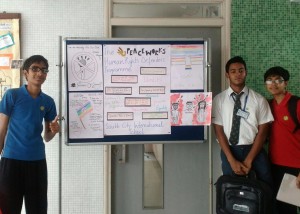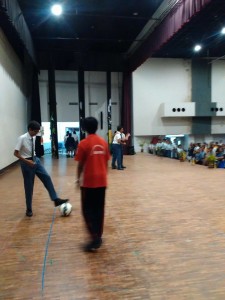Social exclusion. What is it? What does the term mean? Discussions in the classes on Human Rights at the South City International School often revolved around this. When the school played host to the Anne Frank- A History for Today exhibition, students took part in an activity that drove home the fact that social exclusion can happen at even the smallest of scales.
The students who took part in the Human Rights Defenders programme were given the task of developing campaigns that were based on this central theme of social exclusion. Ideating about it meant to them, they came up with three campaigns. The first based on peer pressure, bullying and the impact—very often being social exclusion, the second on how people are ‘excluded’ or shunned based on the clothes they wear, and the third, based on how young people, who face problems that may need psychiatric interventions, are often not taken seriously and potentially marginalized.
The first campaign was chosen to be presented to the larger audience—peers and teachers. After an hour of frantic rehearsal, dialogue modification and ultimately, fun and laughter, we presented a skit depicting a so-called nerd being rebuffed by a girl, and then being harangued by a bully and laughed at by his peers for not being ‘cool enough’. Our audience was a mixed age group of students.
During the skit, when the ‘bully’ makes fun of the ‘nerd’, a few giggles were heard from the audience. When we talked about how they felt it was received afterwards, some of them spoke up.
‘Ma’am, why did they giggle? I don’t think they took it seriously enough.’
‘I think it was awkwardness that made them laugh. Maybe they have experienced bullying?’
After a brief silence, one of them piped up.
‘Ma’am, five minutes are not enough. We have to keep doing this.’
My heart soared.
‘We have to talk to people about these issues, but not talk just for the sake of talking,’ said another.
The others agreed.
Twenty odd sessions with a motley group of teenagers. Self-confessed book worms, footballers and artists. We had problems with schedules, attendance, assignments, I lost my cool on occasion. We had fun, laughed, chatted, discussed. There were many more high points than low.
But when they realised the importance of taking their campaign further, articulating it without any prompting from me, I wanted to high five each one of them. The ability to be a defender of what is right, and speak out against what is wrong, even on an ‘insignificant in the larger scheme of things’ basis, is what I wanted them to gain at the end of the course. Listening to them talking with their teacher about how to take their campaign further I think that they have definitely achieved that goal, and perhaps more.
They did take the campaign further, performing the skit for the entire school at assembly. The acting was very good, the credit for which should go entirely to the students. One of them spoke about the campaign, requesting the audience to speak up against bullying if they ever come across it. They were greeted with handshakes and slaps on the back from their friends, after the performance. One of them, playing the main character had never been on stage before. You wouldn’t imagine it if you saw him.
It is easy to become caught up in minutiae. Exams, homework, and very soon, college. But I do hope, and it is my belief that these students will carry on being defenders, in one way or the other.
– Paroma Sengupta


